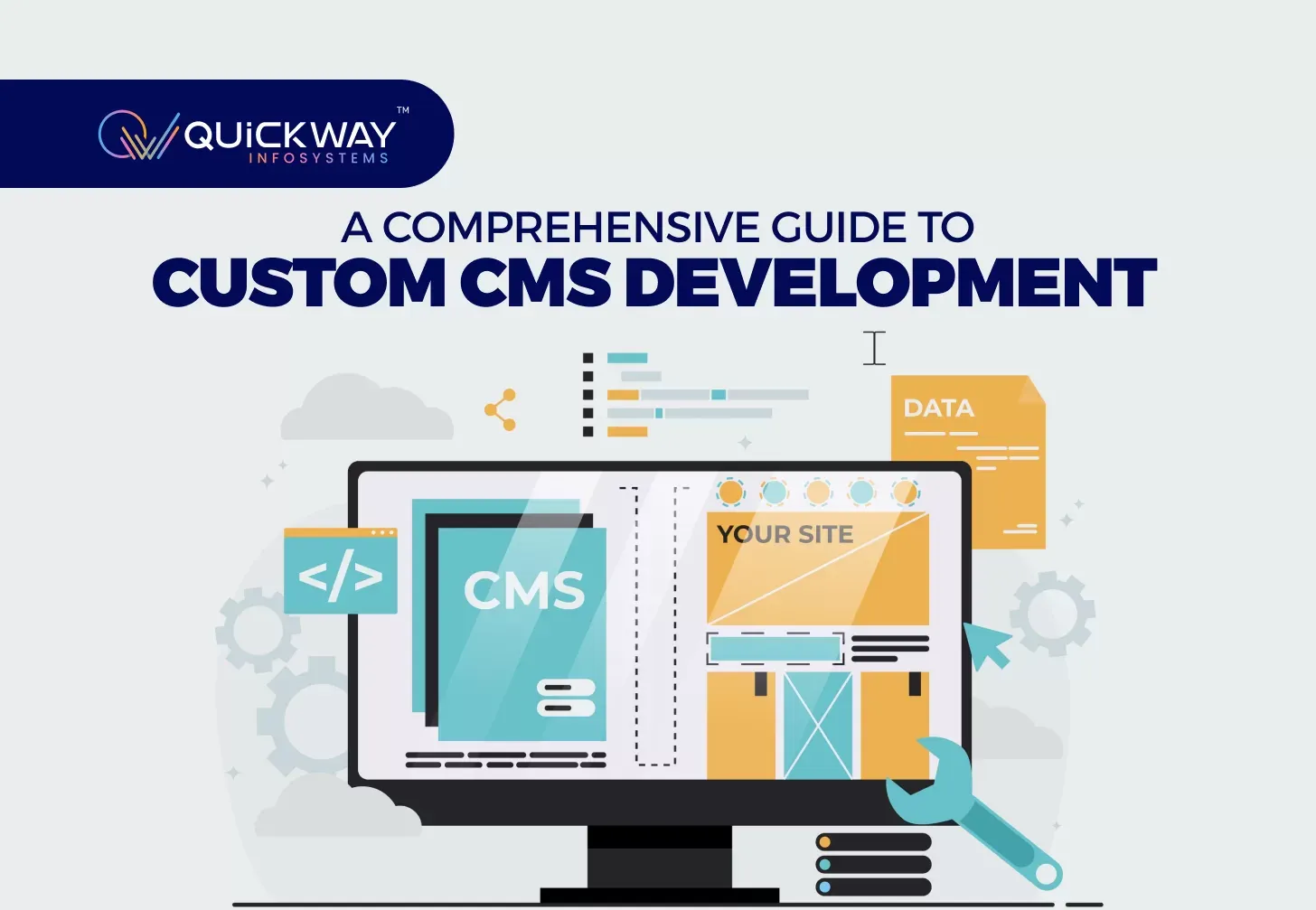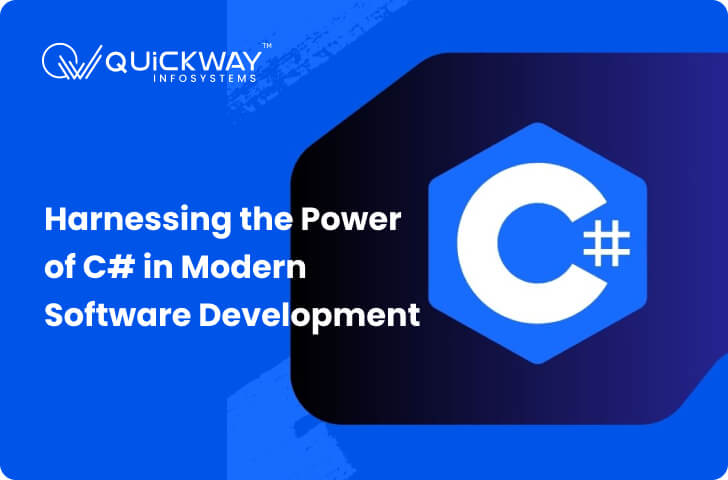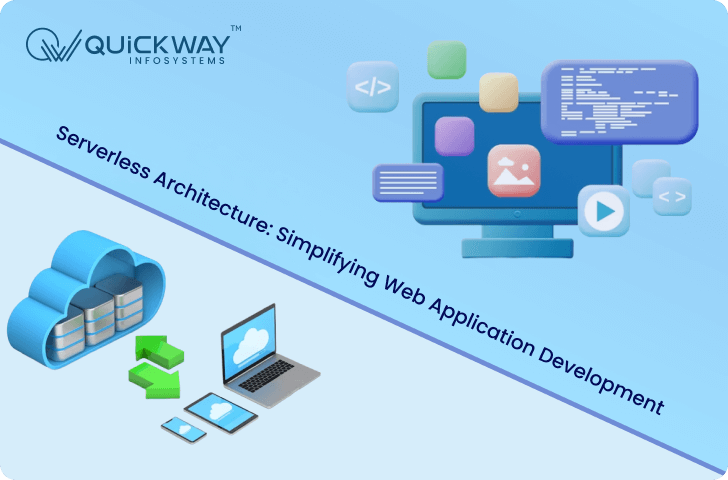Creating a website might feel daunting initially, particularly if coding and software are unfamiliar territory. Fortunately, content management systems (CMS) employ a drag-and-drop editor for assembling components, simplifying website creation and boosting its popularity.
What is a Custom CMS?
A custom CMS serves as a dedicated platform, empowering efficient control over a website’s content. This bespoke solution is intricately crafted to match the distinct requirements of individual websites or businesses. Diverging from the realm of pre-made options, a custom CMS is a ground-up creation, meticulously tailored to meet the specific needs of its users. This adaptable CMS can be meticulously fine-tuned to seamlessly harmonize with the visual aesthetics and functional nuances of a website, facilitating the integration of a myriad of features.
Here are some compelling stats regarding CMS, you must know:
- Around 43.6% of websites are uniquely designed using CMS.
- A staggering number of over 73 million websites have been crafted through CMS.
- Approximately 30.46 million live websites are powered by WordPress.
- By 2022, the tally of websites constructed using WordPress stands at an impressive 835 million.
- A significant 64.9% of CMS users favor WordPress as their platform of choice.
Ready to kick start your new project? Get a free quote today.
Comparing Custom and Open-Source CMS
Custom CMS
A custom CMS is like a tailor-made tool created specifically for a certain company. It can do various things for the business, such as managing content, handling online shopping, and even automating marketing tasks.
When you use a custom CMS, you get exactly what you want right away. If the usual options don’t have exactly what you need, it could be a smart move to build your own personalized CMS.
The best thing is that a custom CMS can easily fit into the websites and software you’re already using. In short, a custom CMS is a special tool that’s created just for your business, but it’s important to think about how everything will fit together.
Open-Source CMS
An open-source CMS is conceived for universal utilization, accessible to all without cost. It features a plethora of functionalities, which might extend beyond immediate needs.
The robust user base of an open-source CMS inherently reduces the prevalence of bugs and errors. However, aligning the extensive array of features with your business specifics might present challenges.
Opting for an open-source CMS could yield significant time and cost savings, particularly if the requirement for specific functionalities or third-party integrations is minimal.
Yet, integrating an open-source CMS might demand supplementary developmental efforts to ensure compatibility.
Its innate generic design might necessitate additional investments in time and resources for customization.
In essence, while a custom CMS is intricately designed to cater precisely to a specific business’s requirements, an open-source CMS offers broader functionality at the expense of potential mismatches with individual business needs.
The Case for Custom CMS Development
In the year 2022, approximately 44% of websites were meticulously crafted using custom CMS. Notably, research spanning the timeframe from 2015 to 2022 underscores a remarkable 75% surge in businesses adopting custom CMS solutions.
The pivotal question emerges: When should you choose a custom CMS instead of an open-source one?
Several compelling consideration:
Outgrowing Open-Source Solutions: While the allure of open-source CMS might seem sufficient, these tools occasionally fall short of addressing the distinctive needs of your enterprise.
Embracing Flexibility: Custom CMS development emerges as the preferred route when greater flexibility is essential. Complex, unique requisites that elude off-the-shelf solutions find a natural fit in custom development.
Tailoring to Business Processes: For a system harmonized with your singular business processes, custom CMS creation stands as an invaluable solution. If your demands exceed the scope of standard offerings and coding proficiency is within reach, crafting a custom CMS can preempt future complications.
Elevating Security: Elevating the primacy of security mandates considering a custom CMS. This bespoke solution empowers you to curate precise access and control protocols for your website.
Optimal Visitor Experience: The inclination towards custom-built systems aligns with the pursuit of an impeccable visitor experience. These backend-engineered systems seamlessly integrate with your website, cultivating a native feel that surpasses other generic templates in its cleanliness and coherence.
Basically, the choice to use a custom CMS comes from changes in how websites are made, a better understanding of unique business requirements, and the urgent need for improved security and customer satisfaction.
Ready to kick start your new project? Get a free quote today.
Crafting a Custom Content Management System: Essential Guidelines
When embarking on the journey of developing a custom content management system (CMS), several crucial considerations should be made:
Meticulous Planning for Smooth Development: Strategic planning during the design and development phases is paramount. This proactive approach helps preempt unexpected challenges and ensures a streamlined development process.
Categorization and Tagging Strategy: At the outset, decide on a comprehensive categorization and tagging system. This fundamental choice enables your CMS to effectively manage and organize content, enhancing user experience and content accessibility.
Opting for Serverless Architecture: Embrace serverless architecture for its inherent benefits in terms of flexibility and cost-efficiency. This approach allows your custom CMS to scale as needed while minimizing operational costs.
Rigorous Testing for Robust Performance: Testing should be an unwavering priority. A robust CMS should seamlessly handle heavy traffic loads and substantial data influx. Rigorous testing ensures optimal performance even under duress.
Navigating Legal Considerations: A vigilant awareness of legal requirements is vital. As you build your CMS, consider data privacy regulations, accessibility standards, and other legal obligations that pertain to your website’s content and user interactions.
Premier Platforms for Content Management System Development
In the realm of content management systems, a diverse array of platforms offers distinct advantages for your development endeavors. Among them are:
WordPress: Renowned as a premier platform for content management system development, WordPress empowers millions of websites worldwide. With its open-source nature and a vast community of developers, WordPress provides a flexible and customizable framework. Its extensive plugin ecosystem allows you to enhance functionality and create tailored solutions for various needs.
Wix: Renowned as a premier platform, Wix spearheads content management system development with exceptional growth, expanding by a remarkable 149% annually. Wix empowers you to craft mobile-friendly, app-like websites with a user-friendly drag-and-drop editor. Furthermore, an extensive library of code snippets lends itself to further customization, catering to both coding enthusiasts and non-technical users.
Squarespace: With a notable 7.03% market share, Squarespace provides an accessible avenue for website creation. Its flexible template system allows for the creation of personalized designs. Squarespace’s emphasis on search engine optimization (SEO) enhances your website’s discoverability, simplifying the process of attracting visitors.
Pulse CMS: A stalwart in the field since 2005, Pulse CMS retains its relevance through innovative features. Its code generator enables the construction of websites without requiring advanced coding skills, generating clean HTML5 code to eliminate broken links and errors.
Sitefinity CMS: Sitefinity CMS stands as a formidable tool for developers, catering to their diverse needs with minimal coding requirements. This platform facilitates the creation of powerful websites with ease, fostering efficiency without compromising on functionality.
In summary, when delving into custom CMS development, careful planning, strategic decision-making, and selecting the right development platform are critical to success. These considerations not only optimize the development process but also pave the way for a robust and tailored content management system that aligns seamlessly with your business objectives.
Ready to kick start your new project? Get a free quote today.
Unlocking Time-Saving Potential with a Custom CMS
In the realm of content management systems (CMS), an array of options beckon, each boasting unique features and benefits. Amid this landscape, a custom CMS emerges as a potent time-saving tool, catering especially to businesses and marketers grappling with copious amounts of content.
Delving deeper, here are additional ways through which a custom CMS can expedite your workflow:
Automated Publishing: The custom CMS offers a gateway to automated publishing. New content seamlessly makes its way to your blog or website without manual intervention. This proves especially advantageous for frequent content updates, translating to substantial time savings.
Strategic Scheduling: The prowess of a custom CMS extends to strategic content scheduling. By crafting content in advance and scheduling its release, you can effortlessly maintain a regular stream of updates. This approach ensures your website or blog remains dynamically current without the daily time commitment.
Tailored Workflow Customization: A defining facet of a custom CMS is its adaptability to your unique workflow. The CMS aligns with your specific requirements, streamlining operations and significantly reducing time invested in grappling with rigid systems.
Avoiding Pitfalls in Content Management System Development
The road to crafting a seamless content management system is paved with careful consideration and vigilance against common pitfalls:
Prudent Platform Selection: The CMS landscape is rife with platforms, each vying for attention. Meticulous research is paramount to select the optimal platform, one that aligns cohesively with your needs and seamlessly integrates with other systems.
Comprehensive Requirement Understanding: A clear understanding of project requirements is the compass that guides development efforts. This insight enables an accurate allocation of time and resources, playing a pivotal role in shaping the final product’s efficiency and cost.
Thorough Research: In-depth research is a cornerstone of success. Gauging the volume of updates, content creation demands, and user behavior provides critical insights that fuel effective planning and resource allocation.
Additional considerations include:
Refrain from assuming that a custom CMS incurs higher expenses compared to open-source options.
Acknowledge the magnitude of development efforts required for building a comprehensive CMS.
Invest time in understanding diverse content management systems to make informed decisions.
Begin with a clear vision of your needs to mitigate unexpected detours during development.
Strive for a balance between ambition and practicality, steering clear of overloading your CMS with unnecessary functionalities.
Rigorous testing is non-negotiable; thoroughly evaluate your CMS before launch to prevent post-launch disruptions.
Ready to kick start your new project? Get a free quote today.
Final Thoughts on using Custom CMS
Considering a custom CMS involves understanding its workings, pros, and cons. While it can greatly benefit certain businesses, its suitability varies. Expert software development agencies like Quickway Infosystems can enhance your project, offering services from web development to app creation.
In decision-making, evaluating your needs is crucial. If you need customization and are willing to maintain a unique CMS, exploring a custom CMS is worth it.



